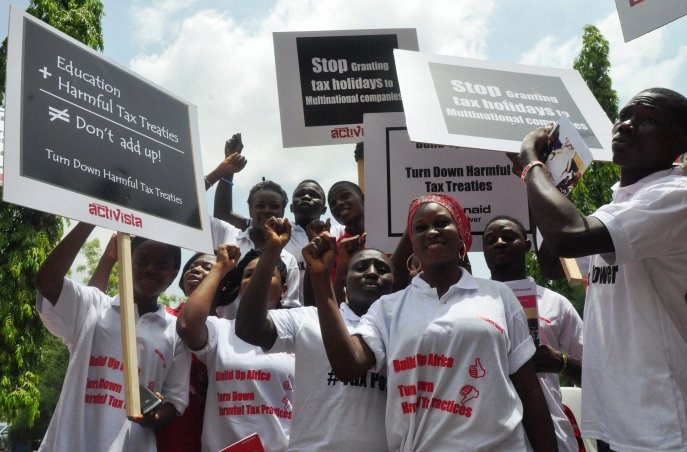On the 15th of each month, action/2015uk invites you to join in making a noise about 2015 - a very important year for people and planet.
---
Right now world leaders are meeting at the major Financing for Development Conference (FFD) in Ethiopia. The meeting is a HUGE opportunity to fund our journey to a world free from extreme poverty, tackle inequalities and stop climate change.
What must world leaders do to finance our future and facilitate ambitious and inclusive global goals? Key voices calling for action at FFD share their thoughts...
Aid Spending
In 1970, world leaders agreed that the richest countries in the world should spend at least 0.7% of their gross national income on international aid and development. 45 years on, and there are only 5 OECD countries who have actually delivered on their promise; Sweden, Luxembourg, Norway, Denmark and the United Kingdom. Further to that, only a third of aid actually goes to those that need it the most, the least developed countries (LDCs).
If the global goals are to succeed, then the rest of the world needs to renew its commitment and spend at least 0.7% on aid and development, and at least 50% of this needs to go to LDCs. 2015 is the year that can set us on the path to the end of extreme poverty, but only if our leaders keep their promise.
Paul Abernethy, Campaigns Officer, The Global Poverty Project

A global problem needs a global solution
As it stands, global tax rules make it too easy for multinational companies to dodge tax in the countries they operate in. This comes at an eye-watering cost to developing countries, with estimates suggesting that tax dodging costs developing countries at least $100 billion in revenue a year!
Money raised from tackling tax dodging would give poorer countries a chance to finance their own development. For example, our report shows, how over 6 years, a mining company called Paladin has managed to avoid paying US$43.16 million in Malawi, one of the world’s poorest countries. If companies paid their fair share of taxes, countries like Malawi could invest in essential public services like healthcare and education, giving their people a fairer chance at breaking the cycle of poverty.
Developing countries need a seat at the table to negotiate the changes needed to make tax fair. That’s why we’re joining campaigners across the world to call for the introduction of a global tax body – a body where countries, rich and poor, have an equal say on what reforms are needed in international tax law.
Steven Frost, Digital Campaigns Assistant, ActionAid UK
Fund water and sanitation
Effective financing is critical to the success of the upcoming Sustainable Development Goals. WaterAid believes that a dedicated Sustainable Development Goal on universal access to water and sanitation is essential as part of an integrated approach to ending extreme poverty. For such a goal to be achievable, world leaders must ensure that Official Development Assistance (ODA) retains a key role in international development policy. ODA to water, sanitation and hygiene should at least double from current levels by 2020, with an emphasis on grant financing, effective targeting, and closure of the gap between commitments and disbursements.
Rebecca Owen, WaterAid
Ensure that funding is fair, leaving no one behind
The latest draft of the Sustainable Development Goals describes a “new social compact” to end poverty in all its forms everywhere. This laudable aim must be supported by adequate financing, with a commitment from every country to a social package of essential public services for every citizen. But if the conversation focuses only on money, we risk turning a blind eye to the very thing that makes development successful and sustainable. That is the people aspect. Too much development co-operation in recent years has focused narrowly on finance and aid, and failed to ask what is actually needed to support people to overcome poverty for good.
The SDGs, and the agreements at Addis about how the SDGs are delivered, are an opportunity to build the space for, and the capacity of, people to define and solve the challenge of poverty themselves and to tackle the deep rooted structures that perpetuate poverty. No-one must be left out of the conversation about how this poverty eradication agenda should be implemented, particularly the most marginalised, and those whose voice is often missing from public debate, such as women and girls.
Naveed Chaudhri, Campaigns Manager, VSO
Be accountable
Where the money goes is as important as the amount of money available. The Summit in Addis Ababa provides an opportunity for financial priorities to be joined up with priorities of eradicating poverty, reducing inequality and protecting the environment, to be agreed later this year.
This would include prioritising investments in renewable energy, like solar and wind, as well as signalling what is no longer considered as acceptable pathways to growth: economies founded on coal, oil and gas, and activity that harms local communities and the environment. It should not be seen as development if the environment is harmed in the process.
At the same time, development finance is increasingly being provided by, or channelled through, the private sector, but too much money either doesn't go to where there is greatest need, or it is still associated with human rights abuses, such as displacement from land and environmental degradation. To ensure that all money goes to development that puts people and planet first and that limits any harmful impacts, the financing summit should ensure that all development finance meets clear sustainable development criteria and has stronger accountability mechanisms.
Graham Gordon, Head of Public Policy, CAFOD